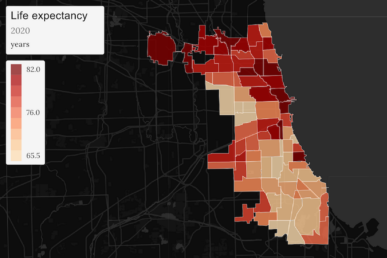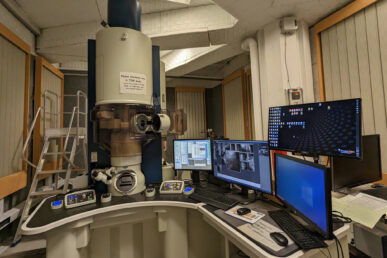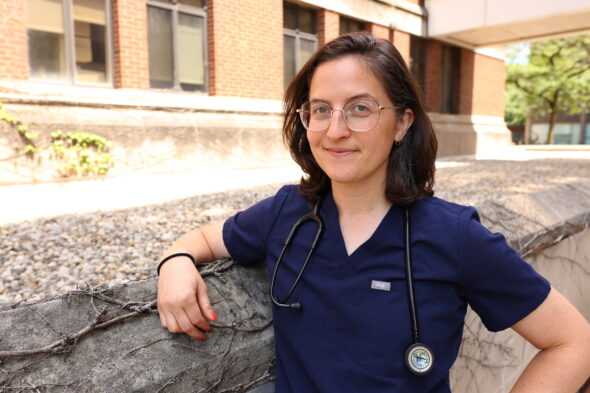Pilot research institutes kindle interdisciplinary activity across UIC
Meeting today’s most crucial scientific challenges requires multifaceted approaches. To address these challenges, the University of Illinois Chicago launched a program in 2023 to fund interdisciplinary pilot research institutes that bring together the unique strengths of UIC’s colleges.
The newest pilot research institute chosen by the Office of the Vice Chancellor for Research — the Institute for Equitable Health Data Science Research — will leverage UIC’s cutting-edge data science and artificial intelligence expertise together with the university’s first-class research in health fields to address urgent health inequities. The pilot institute unites researchers from seven colleges in an effort to ensure that medical applications of new technologies benefit all populations without bias.
This new collaboration adds to ongoing campus-wide efforts chosen by the Office of the Vice Chancellor for Research last year to advance research in substance abuse and addiction, functional and regenerative materials and human-vision sciences. In the coming months, these programs will scale up their activities with pilot project funding, workshops, symposia and external grant application support.
“These interdisciplinary collaborations fuse the research strengths of UIC to create unique, innovative programs tackling ambitious scientific questions,” said Joanna Groden, UIC vice chancellor for research. “They will produce transformative work that could not be achieved by any one individual, department, college or discipline.”
These initiatives and many other examples of groundbreaking science and scholarship will be celebrated at the events of UIC Research Week, April 15-19.
Protecting new health tools from old problems
The mission of the pilot Institute for Equitable Health Data Science Research is to analyze and eliminate potential biases before they are unwittingly embedded in artificial intelligence algorithms in health care. With its interdisciplinary collaborations, the effort will shape solutions for biomedical and health-data science and technology while prioritizing health equity for Chicago’s diverse population and beyond.

Researchers will investigate data and social determinants of health, complete analytical reviews of research methodology and existing algorithms to uncover bias in past research, advise and counsel regulatory boards and create novel technology and Chicagoland datasets to reduce bias in healthcare.
The pilot institute is co-directed by two professors, each an expert in data science and health applications: Andrew Boyd and Elisabeta Marai. Faculty across campus, from the colleges of applied health sciences, business administration, engineering, liberal arts and sciences, medicine, pharmacy and the school of public health, will serve as associate directors and executive board members.
“Data science is critical for the future of healthcare,” said Boyd, associate professor in the biomedical and health information sciences department and associate vice chancellor for research in computing and data initiatives. “However, if we do not add the appropriate health equity and disparity lenses, the inequities and biases of today’s healthcare system will be baked into those algorithms for decades.”
“UIC is an incredible nexus of talented researchers, with world-class expertise in both data science and healthcare,” said Marai, professor in the Department of Computer Science. “These researchers can take the equitable health mission to national and international leadership.”
The pilot institute will spearhead a series of initiatives, including an annual week-long bootcamp to jump start collaborations among researchers on campus, an annual industry summit, seed funding to help produce proof-of-concept results and grant application support. The opportunities for funding and workshops will be open to all UIC researchers.
These activities and expertise will enhance existing UIC efforts examining AI and data in healthcare, including the AI.Health4All Center for Health Equity using Machine Learning and Artificial Intelligence in the College of Medicine; the Population Health Analytics, Metric and Evaluation center in the School of Public Health; and the Clinical Research Data Warehouse in the Center for Clinical and Translational Science by fostering collaborations and helping researchers avoid unwittingly embedding biases.
“We’re committed to solving this problem across the university, with all of our colleges, all of our students and for all of our patients,” Boyd said. “This is who we are here at UIC.”
Catalyzing interdisciplinary research across campus
Visionary ideas and unconventional collaborations also drive the other three groups the Office of the Vice Chancellor for Research selected for support.
The pilot Institute for Functional and Regenerative Materials brings together faculty from the colleges of engineering, liberal arts and sciences, dentistry, pharmacy and medicine. Their focus will draw on UIC’s interdisciplinary expertise and world-class research facilities to design and test new materials that have promise for medical treatments, environmental remediation and energy storage.

The initiative’s research will combine functional imaging — developing new advanced microscopy techniques to characterize the structure of adaptive, smart and biological materials — with the invention of functional biomaterials. These novel materials could be used to regenerate tissue, heal wounds, treat disease or create new laboratory models to test drugs.
The group will soon begin a search for postdoctoral researchers, and they plan to start a symposium and speaker series later this year. The pilot institute is co-directed by Eben Alsberg, Richard and Loan Hill Chair of biomedical engineering; Luisa DiPietro, professor of periodontics; and Robert Klie, professor and head of physics.
Another pilot institute gathers faculty from across seven UIC colleges to tackle a complex, pervasive challenge: substance abuse and addiction. The pilot Institute for Research on Addictions takes a trans-disciplinary approach to comprehensively address this public health and societal crisis, gathering scientists from the colleges of applied health sciences, engineering, liberal arts and sciences, medicine and pharmacy, the School of Public Health and the Jane Addams College of Social Work.
The collaboration, led by Robin Mermelstein, distinguished professor of psychology, and Niranjan Karnik, professor of psychiatry and pediatrics, will study a variety of novel approaches to treating and preventing addiction and substance abuse. These include interventions for substance-use disorders using mobile technologies, screening tools and data-driven models based on natural language processing, agent-based modeling and social media data and predictors and patterns of addiction during adolescence and young adulthood.

In its early months, the pilot institute held a kick-off meeting that spurred four National Institutes of Health grant applications for research projects and training programs currently under review. They also have launched a pilot award program which issued its first funding to a proposal from Sarah Messmer, assistant professor of clinical medicine and pediatrics. Messmer’s study will explore barriers to expanding the services offered by the UIC Community Outreach Intervention Projects in non-urban settings.
A third initiative accepted by the Office of the Vice Chancellor for Research will focus on translational vision science and technology. The effort is led by Deepak Shukla, the Marion H. Schenk Esq. Professor in Ophthalmology for Research of the Aging Eye and professor of microbiology and immunology.
The initiative will support interdisciplinary research on new discoveries that reduce vision loss and cure chronic eye diseases such as age-related macular degeneration, glaucoma and diabetic retinopathy. Its first call for pilot grant proposals closed earlier in April, and the group plans to host technical meetings later this year.
Categories
Featured Academic Research, Research, UIC today
Topics
addiction, data science, health equity, material science, ophthalmology
